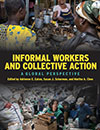Informal Workers and Collective Action: A Global Perspective
Informal Workers and Collective Action features nine cases of collective action to improve the status and working conditions of informal workers.
Adrienne E. Eaton, Susan J. Schurman, and Martha A. Chen set the stage by defining informal work and describing the types of organizations that represent the interests of informal workers and the lessons that may be learned from the examples presented in the book. Cases from a diverse set of countries—Brazil, Cambodia, Colombia, the Dominican Republic, Georgia, Liberia, South Africa, Tunisia, and Uruguay—focus on two broad types of informal workers: “waged” workers, including port workers, beer promoters, hospitality and retail workers, domestic workers, low-skilled public sector workers, and construction workers; and self-employed workers, including street vendors, waste recyclers, and minibus drivers.
View list of all: Books & Book Chapters

